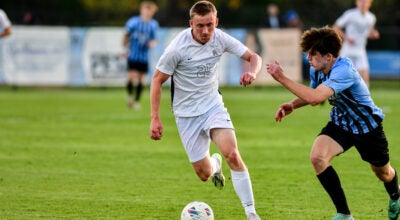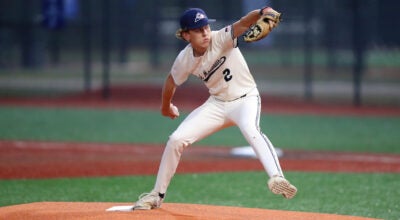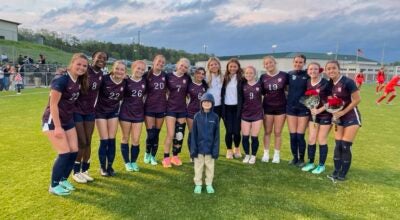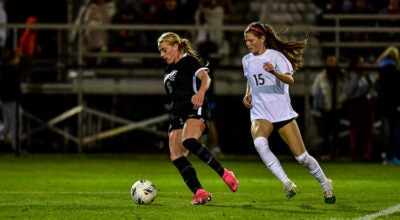Tackling the odds
Published 6:00 am Wednesday, December 21, 2011
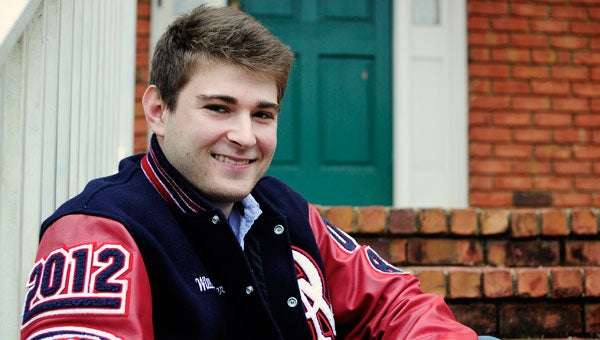
Oak Mountain High School senior William Schweer overcame a rare autoimmune disease to return to the playing field for the Eagles this fall. (Reporter Photo /Jon Goering)
By KALA BOLTON / Staff Writer
Just minutes into the fourth quarter Sept. 30, Oak Mountain High School football coaches called on senior defensive lineman William Schweer. Having watched from the sidelines for more than a year, a nervous Schweer knew this was his time to prove himself. Making the tackle on his first play back, just two weeks after his final chemotherapy session, Schweer proudly lifted his joyful teammates from his back and stood strong and healthy on the gridiron. Fifteen months after being diagnosed with his now inactive Primary Nervous System Vasculitis, Schweer emerged victorious.
“It all happened so fast, but I remember I hit the guy and pushed him off of me,” William Schweer said. “The run play came right into the gap that I was supposed to be protecting, and so I wrapped him up in the backfield and tackled him. I remember, after all of that happened, all the other guys just fell on top of me. I can’t really explain how I felt — it was just really emotional for me.”
William was a seemingly healthy 16-year-old going into his junior year at Oak Mountain. After seeing a fair amount of playing time his sophomore year, William, who quit soccer one year before, had all his energy focused on making an impact on the field. During one summer conditioning workout in May 2010, things began to change.
“I started to feel dizzy, and I thought I’d fight through it,” William said. “So at the end of practice, I had gotten to the point where I couldn’t really walk, and I was just on the ground. My vision was kind of blurry, but I was really stubborn, so I didn’t want to ask for help.”
After passing out on the kitchen floor when he returned home, William’s parents, Julie and Alan, rushed him to St. Vincent’s Hospital, thinking dehydration was the lone cause of their son’s condition.
“It took him a day at least to get him re-hydrated, but when they did the brain scan, they figured out something else was wrong,” Alan said. “That’s where the journey started.”
As William went through a process of elimination to determine his ailment, undergoing more than 30 procedures and tests at both St. Vincent’s and Children’s Hospital during a three-month span, he suffered two more “attacks,” the worst coming during the first few minutes of his junior year.
“I was sitting there talking to some friends I hadn’t seen in a while, and then I started getting kind of hot,” said William, who recognized the signs of his upcoming attack. “Then the room started spinning. I just tried to sit there and overcome it all. I was hoping that nothing would come of it.”
After throwing up on his desk, William was rushed to the nurse’s office. His mother came to pick him up, but when he was unable to get out of the car and he began foaming at the mouth, Julie realized this was worse than any other attack he had suffered. William was rushed to the hospital, where he underwent more procedures to determine his ailment.
“It was just like going through a real stroke,” Alan said. “You can tell they’re really worried. It was intense, and the worst part about it is not knowing what you were dealing with. You just know it’s not good.”
Doctors eventually narrowed William’s condition down to two diseases. Neither had cures, but one was treatable. If William had the other, doctors told him his days would be numbered.
“I didn’t know what either of them were,” William said. “They just told me one was good and one was bad, relatively speaking. I was just hoping for the lesser of the two and that I could overcome that one. I never really got down. I always have faith in the Lord, and he got me through it.”
William was eventually diagnosed with Primary Central Nervous System Vasculits — the lesser of the two.
“In most cases of Primary Central Nervous System Vasculitis, the cause is never determined,” said Richard Brown, a nurse practitioner who closely alongside Dr. Alyssa Reddy, William’s primary doctor, during his treatment at Children’s Hospital. Brown said he has only treated “three or four cases” if the disease since 1997.
“This disease is often an autoimmune process,” Brown said. “It means your immune system is behaving in a way that it shouldn’t, and it’s sort of attacking your own tissue. In his particular case, his immune system was, in all likelihood, injuring his vessel walls in his brain and causing then to be inflamed.”
Although the disease is technically incurable, William underwent a year of chemotherapy to suppress his immune system along with a high-dose of steroid treatments in an attempt to put the disease in remission.
“Not too many years ago, if you had what he has, you would eventually die of strokes,” Julie said. “You might not die fast, but once you had enough strokes or a big one, that would be it. There’s just no other way to treat it.”
While battling the side effects of the chemotherapy and steroid use, including rapid weight gain and sleepless nights, William was still recovering from the damage done during his August attack. He relied heavily on a walker upon his release from the hospital, and impaired vision and left-side motor skill damages plagued him.
“He was blind basically from his nose to the right,” Alan said. “His largest stroke mark is about the size of a silver dollar. It’s on the bottom left of his brain, and that’s what controls his peripheral vision as well as his balance and such. When he went back to football, he found out real quick that he was strong as a bull going backward and forward, but left and right was a challenge balance-wise. It will always be a challenge.”
While many members of the Oak Mountain community were aware of his condition, William said outreach from fellow students and friends, including his girlfriend at the time, fellow Oak Mountain student Molly D’Esposito, helped him during the worst times.
“She was really supportive,” Alan said. “She came to the hospital every day, and it was a huge help. It was nice having that connection to the student body and his friends.”
It was soon time for William to get back to his junior year of school, and he was determined to stay on track in order to graduate on time, planning to attend classes for a half-day everyday followed by a couple of hours of rehab throughout the week. William said the transition back to that schedule was the hardest part of his battle.
“My biggest thing was I felt like he needed to be with people his age, and he needed to be walking,” Julie said. “It made me want to cry the night before he went back for the first time because he was lying in bed, and I was rubbing his back trying to help him go to sleep, and he said, ‘Mom, I don’t know if I’m ready for this.’ A part of me felt like a terrible mom for making him go when he wasn’t ready. It was hard, but he kept going.”
As William began feeling comfortable in his new routine, there remained an extra motivating factor, aside from simple recovery, in the back of his mind.
“At the beginning of chemo, Dr. Reddy tole me that if everything went right a year from when I started, I would have the opportunity to go back and play football again,” William said. “She gave me that little glimpse of hope right at the beginning, so I always had that motivation to stay strong and do stuff the right way so I could get back and play again.”
While no one was positive that William’s second shot on the gridiron would ever come, he continued as a participating member of the football team, attending as many practices and games as he could and remaining a constant presence amongst players and coaches.
“He handled it like a champ,” said former Oak Mountain head football coach Jeff Harris, who coached William in three of his four seasons as a player. “He, at all times, remained an inspirational part of the team. They knew what he was battling, and he continued to come and support the team in a big way, which did nothing but build up momentum for his comeback.”
With that opportunity in hindsight, William was forced to push himself in school and rehab, and he rose to the occasion. William finished chemotherapy in August 2011, exactly one year after he started, and two weeks later, he got his chance. Including his return during the Sept. 30 Thompson game, William participated in four of Oak Mountain’s final five games of the 2011 season, even serving as a captain for the Eagles’ Oct. 21 homecoming match-up with Vestavia Hills High School.
“To be honest, in the beginning, I just didn’t know what the reality was in terms of that happening,” Harris said. “I never knew if this was something he’d be able to overcome in time to play his senior year. It was a really inspirational thing to be a part of. Not only was the whole football team behind him, but he had a whole community behind him, and he beat the odds.”
Having missed out on practice, he relied on fellow defensive line members to describe each play before the snap, and he lacked the stamina to compete for a whole game. While it wasn’t perfect, it was a dream come true for William.
“He couldn’t handle a lot of playing time,” Alan said. “What the coaches gave him to play was about what he needed. He played a couple of series, and that was really great for him.”
While, for now, the battle is over, William has had to adjust to a new way of life — what he and his family describe as a “new normal,” involving constant awareness of anything that could signal a resurgence of the disease.
“He has a new normal, and that’s just a part of the new normal,” Alan said. “He’s had to do things just a little bit differently. One day, we’re hoping there’s a cure for it, but it may never occur again. In the next couple of years, he’ll go back every quarter to get a brain scan and make sure there’s no new damage.”
Reflecting back on the struggle, William’s parents seem awestruck by his unwavering faith. Having raised William and their daughter, Christine, 20, in a Christian environment, the two, who say William “handled it better than (they) did,” believe his faith was what ultimately powered his strength.
“I just admired him so much because he never acted like a victim — he was just strong,” Julie said. “It would have been OK, it would have been alright if he had let down, but I think it’s his trust. He trusts that God is taking care of him, and his nature has always been that way, even as a baby.”
And William makes no mistake about where his motivation and strength originated.
“The Lord got me through everything, and I owe it all to him,” William said. “He just lifted me up through all this, and he just continues to lift me up.”
With May graduation looming, William said he plans to attend the University of Alabama next fall, and having trumped the odds forced the teenager to grow up fast. His parents said they see a completely different William than the one they knew two years ago.
“This whole thing has really matured him beyond 17 years old,” Alan said. “When you go through something like this, you don’t have a choice but to. It makes you, in essence, grow up and understand what life is more about. He’s made us a lot more cognoscente that everyone has a burden of some kind, everybody does. It may not be life-threatening, but everyone has a burden.”
With two healthy children, Alan and Julie said they have much to be thankful for this holiday season, and both hope that their son’s tale of triumph can serve as inspiration for those in need.
“William, I feel like, is a good example for anybody else who is going through a struggle,” Julie said. “It may be a different disease, but he’s come through the other end, and life can go on. God’s just got a different plan for him, but this didn’t happen for nothing.


